2021 was another test of resilience for our programs, our teams, and the communities we work with. Despite these challenges, I am proud to share that our Argentina and Indonesia teams have been hard at work to delivered the below scaled impact in 2021.
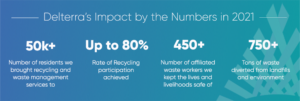
In Argentina, we recently celebrated the 3-year anniversaryof our first program site in Barrio Mugica, one of the largest informal settlements in Buenos Aires. In this year, till date we have diverted ~150 tons of waste and our waste collection services now serve the whole Barrio and have increased the community’s participation rate from nearly nothing to ~40%, making the Barrio the #1 highest recycling and composting neighborhood in the city.
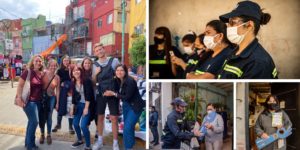
In our second Argentine location, the city of Olavarria, we are steadily ramping up our waste management services with a series of pilots to help us maximize community participation and recycling output. We recently concluded our fifth pilot and are already seeing 40%+ community participation, a rate higher than that of most cities globally and have till date diverted ~50 tons of waste. Additionally, in collaboration with our partners, we are investing in sorting and composting plant equipment, which will enable us to serve the entire population of 120,000 residents as we scale to the full city by the end of 2022.
To further scale our impact in Argentina, we entered into new partnerships with WEF’s Scale 360° initiative and Red de Innovación Local, a network of 280+ cities in Argentina, to guide a cohort of five Argentine cities in trialing recycling solutions that can later be replicated across Argentina and Latin America. Also, in 2022 – in partnership with Avina, a social NGO – we will be setting up the ‘Red de economia circular’ for Ecoplas, a consortium of 40+ plastics processors in Argentina, to help create reliable markets for the materials our supply side programs are recovering.
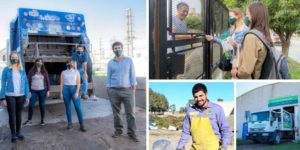
On the other side of the world, in Indonesia, through Rethinking Recycling Academy we are providing formalized recycling and waste management services to 12,000+ residents in 6 urban communities. Promisingly, we are seeing up to 80% of households regularly separating their waste, up from almost nothing before and have till date diverted 550+ tons of waste. By the end of 2022, the graduates of the Rethinking Recycling Academy will serve over 100,000 residents, thus driving inclusive community-owned change for communities that had no access to waste management services before.
Additionally, in preparation for hosting G20 in Bali next year, the Ministry of Maritime and Investment has released US $7M in funds to support the transformation of waste management in Southern Bali. We are excited by this renewed focus on waste management and were pleased to welcome members of the Indonesian Ministries to our sites in Bali to showcase a rapidly scalable and sustainable waste management solution for the region.
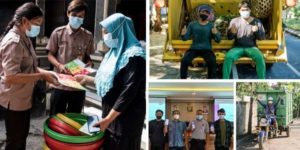
All this grassroots impact is supported by the two innovations released by our Digital Team this year. The first is an operations platform that digitizes key operational processes for sorting centers. Our ‘Ops Platform’ is already live in 3 sorting centers – 1 in Argentina and 2 in Indonesia – where it is enabling an increase from 20% to 80%+ in payment collection rates, thus helping us drive up the profitability of these community owned businesses. Already, 1,300+ customer payments are being managed through the platform and 80+ tons/month of waste is being tracked through just one of the Indonesia pilots, with plans in progress to roll-out to many more sites.
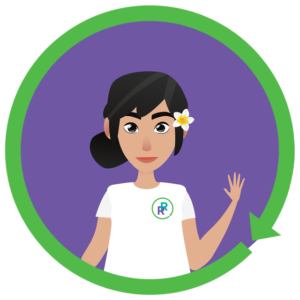 Our second digital tool is a customer-facing WhatsApp chatbot to help residents accurately source-separate their waste at home. In Indonesia it is called Ami, short for ‘Ayo Milah’ or ‘Let’s Sort’ in Bahasa, and in Argentina it is called Giraldo. Ami and Giraldo have been rolled out to 500+ households and not only respond to customer questions on recycling but are also a great vehicle for educational/motivational push-campaigns that drive behavior change. Early results are encouraging and indicate an average improvement of 40% in weekly sorting scores in the pilot groups.
Our second digital tool is a customer-facing WhatsApp chatbot to help residents accurately source-separate their waste at home. In Indonesia it is called Ami, short for ‘Ayo Milah’ or ‘Let’s Sort’ in Bahasa, and in Argentina it is called Giraldo. Ami and Giraldo have been rolled out to 500+ households and not only respond to customer questions on recycling but are also a great vehicle for educational/motivational push-campaigns that drive behavior change. Early results are encouraging and indicate an average improvement of 40% in weekly sorting scores in the pilot groups.
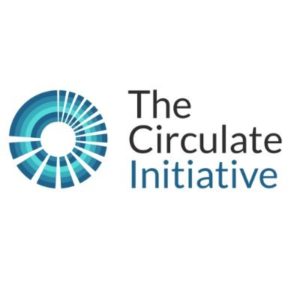 Last, but not the least we are excited to begin to share what we are learning more broadly. Our knowledge team recently co-authored with The Circulate Initiative a thought-provoking report on the ROI of Behavior Change in Recycling. The report affirms how changing recycling behavior isn’t just a nice-to-have, but instead is key to making the economics of recycling work; how investment into driving change in recycling behavior can pay for itself in as few as 2-4 years; and is significantly cheaper than any technological alternatives.
Last, but not the least we are excited to begin to share what we are learning more broadly. Our knowledge team recently co-authored with The Circulate Initiative a thought-provoking report on the ROI of Behavior Change in Recycling. The report affirms how changing recycling behavior isn’t just a nice-to-have, but instead is key to making the economics of recycling work; how investment into driving change in recycling behavior can pay for itself in as few as 2-4 years; and is significantly cheaper than any technological alternatives.
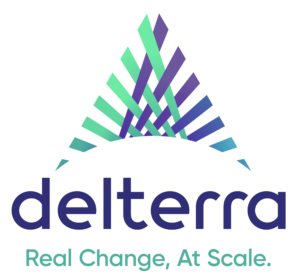 Underpinning all of the above is our new brand identity, Delterra. As you will remember, this year we founded Delterra, an independent non-profit organization – with the support of our founding partner McKinsey & Company. This new entity was established to house Rethinking Recycling as we scale and accelerate its impact. Within our new home of Delterra, we are still the same team of passionate changemakers on a mission to create a world where human activities protect and restore a healthy planet. We look forward to continuing to partner with you, now as Delterra, to redesign human systems for the good of people and the planet.
Underpinning all of the above is our new brand identity, Delterra. As you will remember, this year we founded Delterra, an independent non-profit organization – with the support of our founding partner McKinsey & Company. This new entity was established to house Rethinking Recycling as we scale and accelerate its impact. Within our new home of Delterra, we are still the same team of passionate changemakers on a mission to create a world where human activities protect and restore a healthy planet. We look forward to continuing to partner with you, now as Delterra, to redesign human systems for the good of people and the planet.
